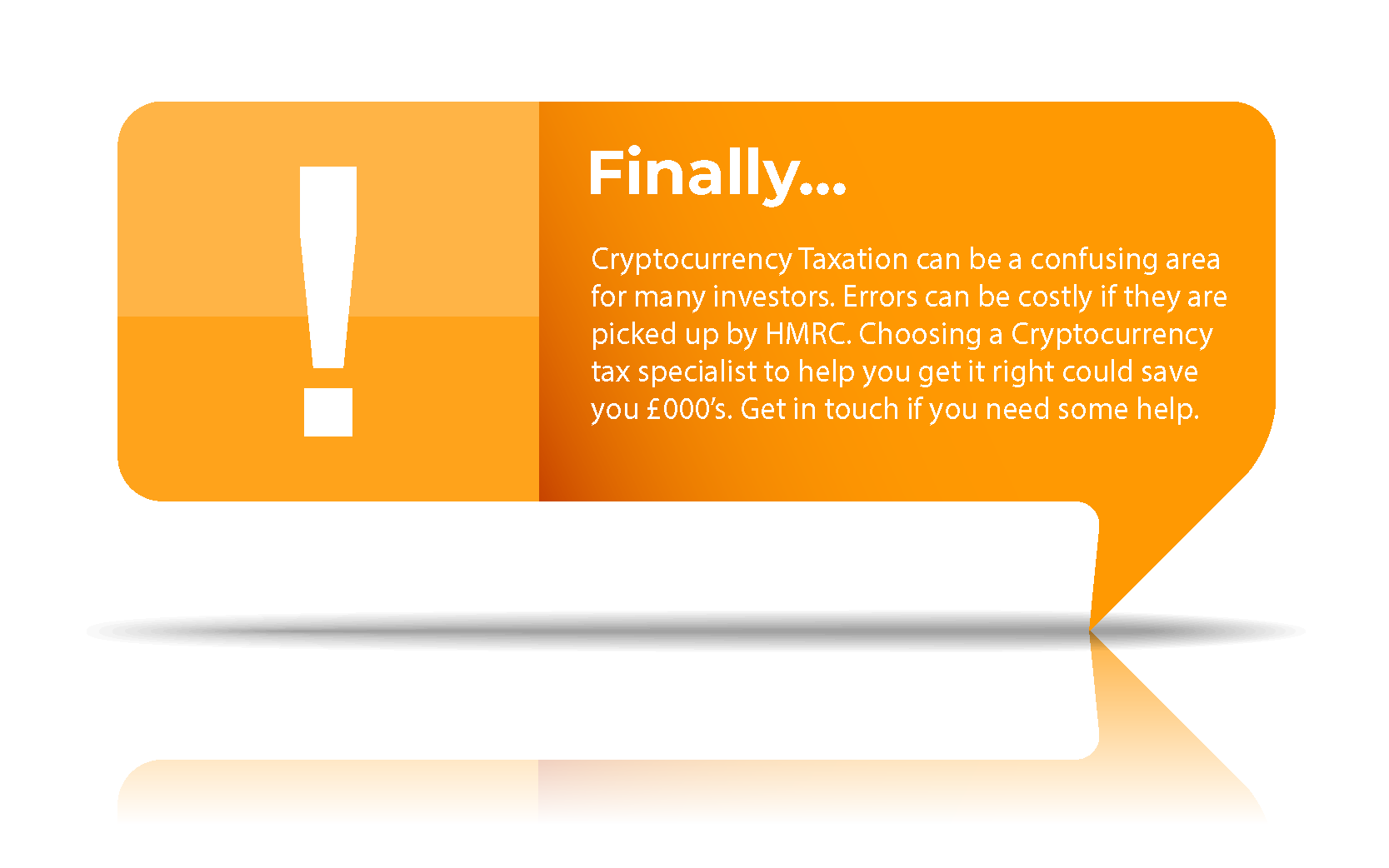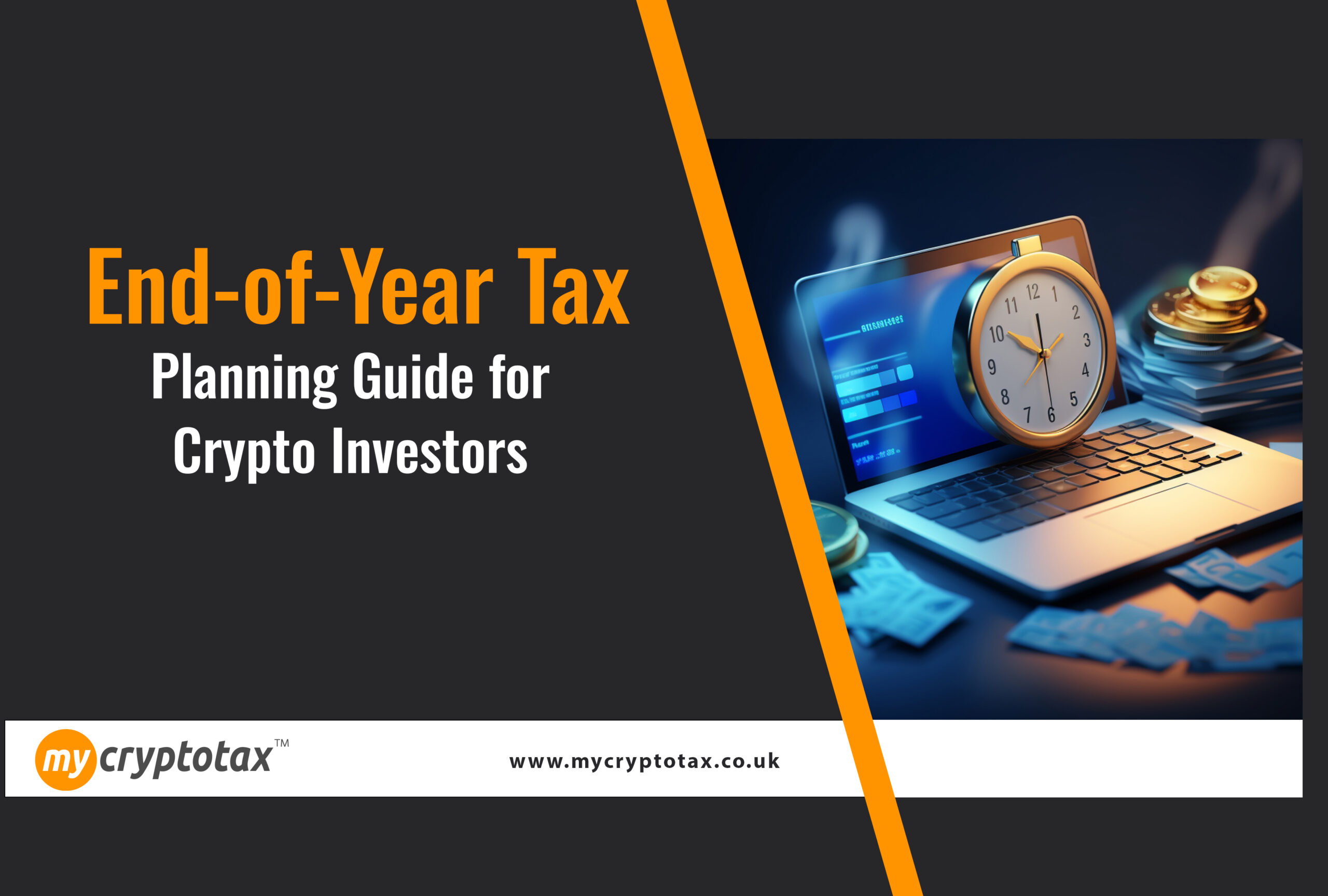Why Crypto Tax planning Strategies are important?
Cuts to the capital gains tax (CGT) exemption mean that arranging your crypto investments as tax efficiently as possible is more important than ever.
Previously, investors could make tax-free gains of up to £12,300 a year, but this exemption has been slashed to £6,000 for the 2023/24 tax year and is due to be cut again to £3,000 in 2024/25.
Higher and additional-rate taxpayers will pay CGT at 20% on gains that exceed the exemption.
Nobody wants to pay tax more than necessary. The timing of asset disposals can significantly impact the tax outcome, especially around the end of the tax year.
As we near the end of tax year, below are some tips and guidance to assist you in being proactive in managing your crypto tax liability, Individuals can optimize their tax position and potentially save thousands of pounds. Tax planning strategies need to be actioned by 5 April 2024 to fall into the 23/24 tax year
It is recommended you seek professional advice for your circumstances before implementing these strategies.

How To Reduce Crypto Taxes? 10 ways to reduce Crypto taxes.
1. Make use of your CGT allowance, don’t waste your CGT annual exemption
Each individual has their own annual exempt amount for capital gains tax purposes. This amount is set against net gains for the tax year, taking into account chargeable gains and allowable losses. It is essential to utilise this annual exempt amount within the tax year as it cannot be carried forward. Failure to do so would result in a missed opportunity for tax savings. To optimize this opportunity, consider limiting realized losses, leaving room to offset £6,000 in capital gains with the CGT-free exemption.
2. Transfer Crypto to your spouse
Spouses and civil partners can transfer assets between themselves, presenting a valuable tax planning opportunity. If one spouse or civil partner has already utilised their annual exempt amount, transferring the asset or a share of it to the other spouse or civil partner prior to disposal allows the unused annual exempt amount to be set against the gain. This strategy can potentially maximise the tax efficiency of both individuals and allow you to double the capital gains tax (CGT) exemption of £6,000.
3. Make use of losses
It might be wise to sell some assets at a loss if the overall gain in the tax year exceeds the annual allowance. Gains and losses established in the same tax year must be offset against each other, so will reduce the amount of gain that is subject to tax. Losses must be registered with HMRC within four years from the end of the tax year in which the loss has occurred. You’re allowed to deduct certain costs involved with buying and selling (incidental costs of acquisition and disposal ) Crypto Assets from your gain when working out your CGT bill. These include: transfer fee, exchange fees, gas fee, fee for professional service such and lawyers and accountant relating to the buying and selling the crypto.
4. Engage in Tax loss harvesting
Optimize your tax strategy by selling crypto or NFTs at a loss, allowing you to offset capital gains within the same tax year or carry the losses forward for future use. Notably, NFTs are exempt from S104 pooling rules, and the 30-day matching (bed & breakfast) rules do not apply. This means you can sell an NFT at a loss to a third party, record the loss to offset gains in the current tax year, and subsequently repurchase the NFT.
5. Claim Negligible Value Claim
If you own any crypto or NFT which has become of negligible value in your ownership then you may be able to make claim to minimize your tax.
6. Charitable donations of crypto
Making a donation of crypto to a qualifying charity is a no gain/no loss disposal for CGT purposes, so no tax is payable. Donations of crypto do not qualify for gift aid income tax relief.
7. Invest in HMRC backed tax efficient investment schemes
Investing in certain companies through The Enterprise Investment Scheme (EIS) and the Seed Enterprise Investment Scheme (SEIS) could make you eligible for significant income tax relief and CGT deferral relief/exemptions.
8. Tax Efficient Structuring
If your other income is high, consider transferring income yielding crypto to your spouse (if they have a lower annual income level) or into your own Limited Company.
Splitting capital gains over two tax years, or crystallizing the gains in a tax year with lower income or transfer to spouse with lower income. This can help reduce the CGT rate applied to part of the gains (from 20% to 10%).
9. Contribute to a pension
Making a pension contribution from relevant earnings could help you save on CGT because it effectively increases the upper limit of your income tax band.
10. Residency Tax planning
UK tax liability for your crypto disposal is based on your UK residency status. Careful planning of your residency status may allow you to avoid paying tax in UK.
Seek professional advice
There are lots of ways to reduce CGT, ensuring more of your money goes towards your future. However, CGT can be highly complex and, without expert advice, there’s a risk you could end up paying it unnecessarily. CGT is a complicated subject, so make sure you seek professional advice. An adviser will make sure you’re maximizing all your tax reliefs, allowances and exemptions, explain your options, and advise on the best course of action for your individual circumstances.

DISCLAIMER
© My Accountancy Team 2023 All Rights Reserved – The above articles are provided for guidance only and may not cover your personal circumstances so you should not rely on them. It is important that you seek appropriate professional advice which takes into account your personal circumstances where you can provide the full facts of the case and all documents related to your case. My Accountancy Team Ltd t/a mycryptotax.co.uk, cannot be held responsible for the consequences of any action or the consequences of deciding not to act.

Do you have a question for our experts?
If there’s cryptocurrency tax issue that has you puzzled or worried, get in touch. Everyone on our team loves to talk, especially when it helps people like you find peace of mind.
Schedule a free consultation with one of our Crypto Tax Experts and get your questions answered fast!
 Client Login
Client Login

